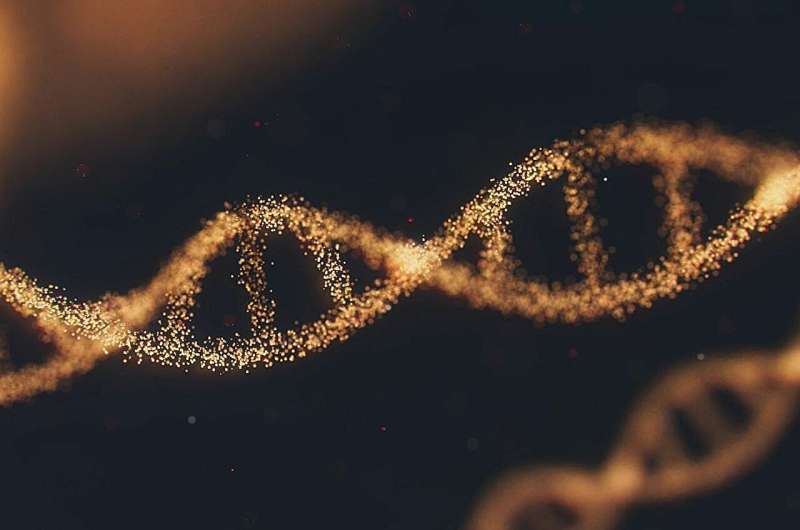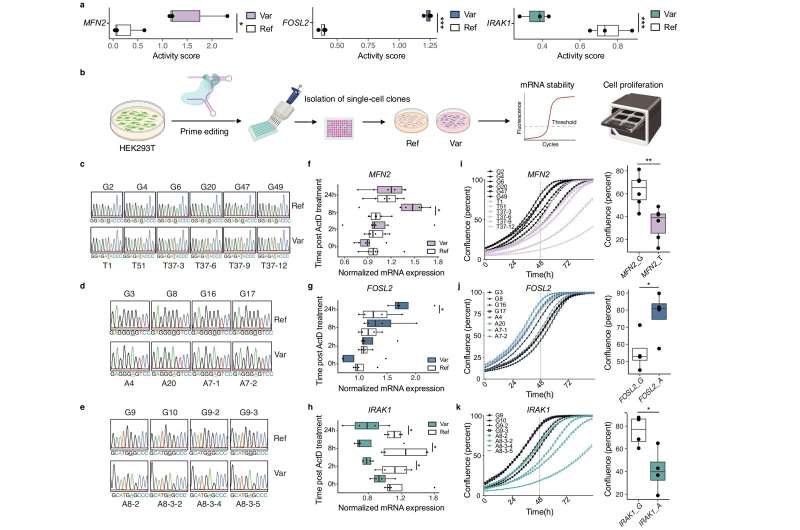This article has been reviewed according to Science X's editorial process and policies. Editors have highlighted the following attributes while ensuring the content's credibility:
fact-checked
peer-reviewed publication
trusted source
proofread
Mutations in noncoding DNA become functional in some cancer-driving genes

Some genes are known to drive cancer, and astonishing new research shows why: Mutations in the noncoding regions become functional, altering the abundance of messenger RNA, or mRNA, and potentially facilitating cell proliferation. Even more surprising, the number of mutations in these regions can predict patient survival time for certain types of cancer.
Most genes are a sequence of DNA that holds the recipes for producing proteins. Proteins, in turn, are chains of amino acids that the body uses to send signals between cells, build and repair tissues, and for countless other functions necessary for life. Within these genes, certain areas are directly translated into proteins, whereas others, referred to as noncoding regions, do not directly contribute to protein production.
But these silent, noncoding regions are far from lazy. They act much like a basketball coach during a game, directing the active regions of the gene to either enhance or suppress their expression, thus playing a crucial regulatory role.
Mutations in these noncoding areas are relatively common, yet they were once thought to have minimal impact on an organism's functions because they don't alter a protein's recipe. But what happens to their regulatory duties when a mutation occurs?
Researchers at UCLA now have an answer. Mutations in these noncoding areas are relatively common, yet they were once thought to have minimal impact on an organism's functions because they don't alter a protein's recipe. However, researchers at UCLA made an important discovery: These mutations lead to the production of abnormal amounts of mRNA. mRNA serves as the DNA's courier, carrying the blueprint for protein production from the cell nucleus to the cytoplasm, where proteins are synthesized.
When mutations cause changes in mRNA levels, it can lead to either an excess or deficit in protein production, akin to the culinary disaster of mistaking a teaspoon for a cup of salt in a recipe. Because cancer involves the unchecked growth of cells, the abundance of mRNA might activate—or fail to inhibit—the proliferation of cells, ultimately leading to tumors and cancer.
The researchers made this discovery by synthesizing thousands of mutations into fully functioning DNA reporters—a kind of gene that helps scientists study what a gene expresses—which they put into cells, then analyzed the resulting alterations in mRNA abundance. The findings were published in the journal Nature Communications.
"Predicting the outcomes of mutations in protein-coding regions is relatively straightforward, but understanding the functions of mutations in noncoding regions presents a significant challenge," said corresponding author Xinshu 'Grace' Xiao, a UCLA professor of integrative biology and physiology. "We designed a high throughput experiment capable of simultaneously assessing a vast array of mutations."

Some noncoding mutations are so rare they occur in only a few individuals. Plus, every person has their own unique mutations. Rare mutations are challenging to study because their scarcity means they are hard to obtain in statistically meaningful quantities.
"We focused on these poorly understood rare mutations because, with our method, we could generate any number of them, offering an unprecedented opportunity to figure out what they do," Xiao said.
This exploration led to a completely unforeseen discovery: Many of the rare, functional mutations were associated with genes linked to cancer pathways.
This finding shifted the research to the singling out of genes known to drive cancer. These notorious cancer driver genes have many somatic mutations—acquired over the course of the individual's life rather than through inheritance—in noncoding regions that aren't understood. The team repeated their experiments, this time testing 11,929 somatic mutations in 166 cancer driver genes.
They discovered that a large fraction—33%—of somatic mutations in noncoding regions of 155 of the 166 tested cancer driver genes can change mRNA abundance. But Xiao's group didn't stop there. They combed a cancer database to find patients who had these mRNA-modulating rare mutations and found many. Turning over this stone revealed an even bigger surprise.
"The number of functional mutations in untranslated regions can predict patient survival for certain cancer types," said Ting Fu, the first author of the article and a postdoctoral scholar in Xiao's lab. "We called this metric 'untranslated tumor mutation burden' or uTMB and found particularly striking the association between uTMB and lung squamous cell carcinoma as well as head and neck squamous cell carcinoma."
This insight opens up new avenues for the development of prognostic testing tools. By calculating uTMB for individual patients, health care professionals could gain valuable predictions regarding survival outcomes to guide the selection of the most effective treatment options.
The findings also signal a promising new direction for research into the gene regulation mechanisms implicated in cancer. Understanding how these mutations influence mRNA abundance—and, by extension, protein production—could shed light on the intricate processes that drive cancer progression.
"Our next objective is to unravel the precise regulatory mechanisms by which these mutations function in cancer cells. Given their impact on mRNA levels, the underlying mechanisms could hold critical importance for the advancement of cancer treatment," Xiao said.
More information: Ting Fu et al, Massively parallel screen uncovers many rare 3′ UTR variants regulating mRNA abundance of cancer driver genes, Nature Communications (2024). DOI: 10.1038/s41467-024-46795-7



















